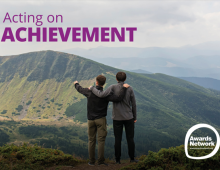To whom it may concern,
We are writing this letter to express our shared hope that the John Muir Trust can urgently reinstate the John Muir Award, or explore solutions to ensure its availability, having ‘paused’ it in March 2024. It is an important part of Scotland's learning, engagement and achievement landscape. Awards Network data shows that the John Muir Award accounted for almost 12% of all youth awards achieved by young people in Scotland in 2023.
The John Muir Award has existed for 27 years, longer than the Awards Network in Scotland. The John Muir Trust was a founding member in 2008 and has been a significant positive influence in supporting the network's development. In particular, its lead has promoted nature-based learning experiences, connecting with wild places and conservation volunteering as key features of youth awards.
The John Muir Award is widely recognised as a pioneering initiative that has served hundreds of thousands of young people (and adults – educators, youth workers, families) in Scotland and throughout the UK. It has helped fulfill the John Muir Trust’s commitment to ‘Wild Places for All’ by removing barriers such as costs and bureaucracy that can distance young people from experiencing and taking action in and for wild places.
The John Muir Award is valued as an initiative that encourages young people to connect with nature and develop a sense of responsibility towards wild places. It offers an accessible framework for individuals and groups to engage in various outdoor activities and conservation projects, providing support and recognition for their efforts. Its flexible and adaptable design suits wide-ranging needs and interests, making it a popular choice for schools, youth groups and families. In particular, it is accessible for all abilities; it can be the first recognised achievement helping to set people on their personal youth awards and future career journey based on an inclusive hands-on approach.
Last year (2022-23) 15,281 people in Scotland completed a John Muir Award, through 354 schools plus youth groups, outdoor centres, national parks, home learners and other agencies. Almost a quarter (23%) of recipients are from disadvantaged backgrounds, a ratio of inclusive participation that has been maintained for 25 years.
Positive regard extends beyond the Awards Network. As the John Muir Trust will be aware, a study led by Professor Richard Mitchell at the University of Glasgow found that:
- 1 in 10 participants had never visited a wild place before their John Muir Award involvement. Those living in the poorest circumstances were over 6 times more likely to have had no experience of wild places.
- The vast majority (95%) of respondents enjoyed their John Muir Award experience and felt they had achieved something by doing it (92%). Conservation activities, the chance to do new things, and the chance to mix with existing friends and make new ones were at the heart of their enjoyment.
- The vast majority of respondents reported that their John Muir Award involvement made them want to spend more time outdoors and to visit natural environments more. This impact was powerful for those from Scotland's poorest neighbourhoods.
All these factors, along with its longevity and accessibility, ensure that the John Muir Award is among the most valued and recognised youth awards in Scotland. It is integral to many learning opportunities and complementary to other awards in our network.
Jo MacDonald, Head of Programmes and Business Development at Youth Scotland confirmed:
“We know that a number of our grassroots member groups really value the John Muir Award as a user-friendly framework to help young people connect with nature. It has been key in helping youth workers and volunteers shape accredited programmes of activity in a community-based youth work setting.”
Helen Anderson, CEO of DofE Scotland added:
“The John Muir Award and The Duke of Edinburgh’s Award (DofE) are both nationally recognised Awards that support personal development. The John Muir Award offers a framework to support and enhance experiences within the Expedition, Volunteering, Physical, Skills and Residential sections. Both Awards can be easily integrated. By ensuring that participants recognise how they have fulfilled the criteria of each, the John Muir Award can contribute to a DofE programme. The John Muir Award plays an important role in encouraging people of all backgrounds to connect with, enjoy and care for wild places in a spirit of fun and adventure.”
Marielle Bruce from YouthLink Scotland highlighted:
“The John Muir Award is an important element of Scottish education. It provides a framework for youth workers and teachers to give children and young people access to learning through nature and recognise their achievements. The Award has built a strong reputation across the education system, demonstrating how Learning for Sustainability can be embedded within the curriculum. It is also helping to address the inequity of access to learning through nature, broadening opportunities for skills development, knowledge and inspiration for young people impacted by poverty. During the COVID pandemic, we saw the negative impact of removing young people’s access to spaces for youth work and their ability to meet with youth workers. A pause on access to the John Muir Award - and the important relationships that are created through the Award, could similarly impact the educational, social and personal development of children and young people who need it most. It will also take some time to rebuild the relationships across youth work, schools and with young people.”
At our annual gathering of awards providers and delivery partners in March this year, a film was created by Education Scotland where several participants spoke about their interactions with the John Muir Award:
- A youth worker from Glasgow Life described how it is helping to support greater partnerships between Glasgow Life and schools in less affluent areas of the city.
- One school successfully put 120 young people through their John Muir Award, which resulted in wider recognition for both the young people and the school. It was a key factor in the school receiving its Eco-School-Award from Keep Scotland Beautiful.
- The Safer Communities Youth Action Project in Camelon, Falkirk praised the John Muir Award for not being overly prescriptive and useful for engaging young people with different community safety themes, particularly around conservation and climate change.
Many Awards Network members are concerned that years of partnership and progress might be undone by pausing the John Muir Award, forcing schools, youth organisations, support staff and families to seek alternatives or miss out completely. The timing of this action could hardly be less fortuitous, with education reforms poised to open new possibilities for non-curricular learning and recognising personal achievement. As more, rather than fewer learning providers consider using youth awards, nature-based awards are needed to explore climate and nature emergencies and the value of wild places. Taking the John Muir Award off-stream for a significant period, with a lack of clarity about its future, can have a much bigger ripple effect that may be difficult to remedy.
There is little doubt that over two decades the John Muir Award has influenced and contributed to many Scottish Government policy dimensions across themes of education, environment, health and wellbeing. Here are some recent examples and links:
- HM Inspectors/Education Scotland report ‘Successful Approaches to Learning Outdoors’ (February 2022) – five mentions
- Education Reform – Ken Muir Report
- Independent Review of Qualifications and Assessment
- Outdoor Learning
- Learning for Sustainability and Literature Review
- Learning and outdoor play
- The benefits of Green Health
- A Connected Scotland (tackling social isolation and loneliness)
- Greenspace Design for Health and Wellbeing
- Environment Strategy and Tackling the Nature Emergency
- Cairngorms National Park and Loch Lomond & The Trossachs National Park Strategies
Both national parks in Scotland established long-term partnerships to co-manage the John Muir Award and promote outdoor learning opportunities. For over 20 years the Cairngorms National Park has organised activities such as wildlife surveys, tree planting, and outdoor exploration for school groups and families. Loch Lomond & The Trossachs National Park has integrated it into staff development and numerous school engagement programmes as captured in an Impact Report. Numerous case studies cite the John Muir Award as a catalyst for learning in nature (see Nature Scot example).
The Scottish Attainment Challenge (SAC) 2023 (p.15) emphasises the importance of improving outcomes for children and young people impacted by poverty, focusing on tackling the poverty-related attainment gap. In reflecting on the breadth of achievements and experiences and the importance of health and wellbeing to reach positive destinations, local authorities are guided to set their own ‘stretch aims’ by including initiatives like the John Muir Award. City of Edinburgh Council notes that around 40 schools use it annually, for example.
The Learning for Sustainability action plans 2019, 2023 reinforce that all learners should have a right to Learning for Sustainability (including benefiting from Outdoor Learning approaches) that is robust, demonstrable, evaluated and supported by leadership at all levels.
Notably, much of the John Muir Trust’s good reputation is due to the considerate approach of its current and past staff, particularly Toby Clark, the Scotland John Muir Award Manager. Many network peers seek him for support and advice on nature engagement, advocacy and policy. For instance, when Tila McDonald took over the lead role for the Awards Network, following Jim Duffy, Toby shared key insights and encouragement. An example of his collaborative approach is the creation of the well-received Nature-based Youth Awards resource.
Concerns about the future of the John Muir Award are increasingly evident, with delivery partners and schools experiencing disruptions as they try to adjust their programmes and expectations. The quantity and quality of awards data collected by the Awards Network will be affected if John Muir Award data are removed, as it accounts for a significant proportion of results.
Our greatest concern, as we recover from the COVID-19 pandemic and lockdown, is that young people in Scotland will miss out on opportunities to get outdoors and into wild places due to losing access to the John Muir Award. The Awards Network hopes the Trust recognises that the John Muir Award can continue to be a leading voice across formal and informal education to enrich society by encouraging people to learn about, experience and protect wild places.
Should others wish to use this Letter of Support – to share with their networks and contacts or to forward to the John Muir Trust to add their support – please feel free to do so. You are welcome to copy in Awards Network (using contact@awardsnetwork.org ) and use #JohnMuirAward on social media along with #amazingthings so that others see the breadth of support available.
Thank you for considering this letter.
Tila McDonald
Awards Network
On behalf of the Awards Network Strategy Group

